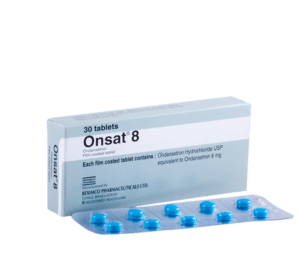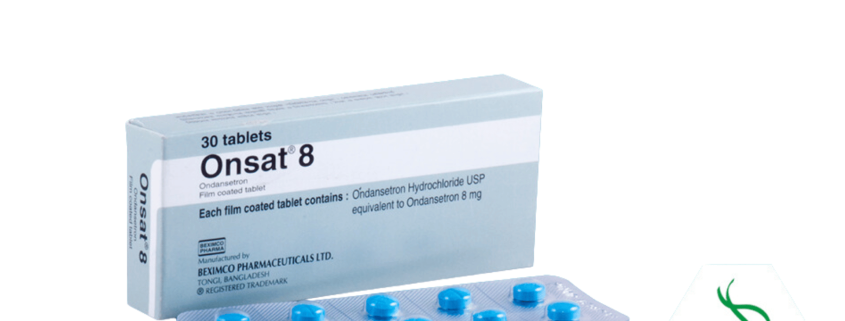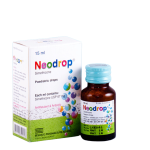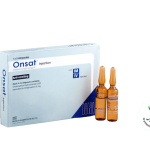Onsat

Generic Name: Ondansetron Film coated
Dosage Form: Tablet
TG Name: Gastrointestinal
1. What Onsat is and what it is used for?
Ondansetron is used to prevent nausea and vomiting caused by cancer drug treatment (chemotherapy) and radiation therapy. It is also used to prevent and treat nausea and vomiting after surgery. It works by blocking one of the body’s natural substances (serotonin) that causes vomiting.
2. Before you take Onsat
Ondansetron are contraindicated for patients known to have hypersensitivity to the drug.
Take special care with Onsat
Check with your doctor before taking this medicine if:
Hypersensitivity reactions, including anaphylaxis and bronchospasm, have been reported in patients who have exhibited hypersensitivity to other selective 5-HT3 receptor antagonists.
The use of ondansetron in patients following abdominal surgery or in patients with chemotherapy-induced nausea and vomiting
Taking other medicines
Apomorphine- profound hypotension and loss of consciousness.
Pregnancy and breast-feeding
Reproduction studies have been performed in pregnant rats and rabbits at daily oral doses up to 15 and 30 mg/kg per day respectively and have revealed no evidence of impaired fertility or harm to the fetus due to Ondansetron. There are however, no adequate and well controlled studies on a pregnant women. Ondansetron is excreted in the breast milk of rats. So caution should be exercised when Ondansetron is administered to a nursing mother.
3. How to take Onsat?
Taking this medicine
Always use Onsat exactly as your doctor has told you. You should check with your doctor or pharmacist if you are not sure.
If you take more Onsat than you should
If you have too much of this medicine, talk to your doctor straight away.
If you stop taking Onsat
Do not stop taking this medicine without talking to your doctor. You should not stop taking Onsat just because you feel better. This is because the problem may come back or get worse again.
If you have any further questions on the use of this product, ask your doctor or pharmacist.
4. Possible side effects
Like all medicines, Onsat can cause side effects, although not everybody gets them.
The most common adverse drug events (≥5%) in chemotherapy-induced nausea and vomiting and radiotherapy-induced nausea and vomiting trials were: headache, malaise/fatigue, constipation, and diarrhea. The most common adverse event (≥5%) in postoperative nausea and vomiting trials was headache.
Tell your doctor if any of the side effects gets serious or lasts longer than a few days, or if you notice any side effects not listed in this leaflet.
5. How to store Onsat?
Store in a cool and dry place, away from light. Keep out of reach of children



